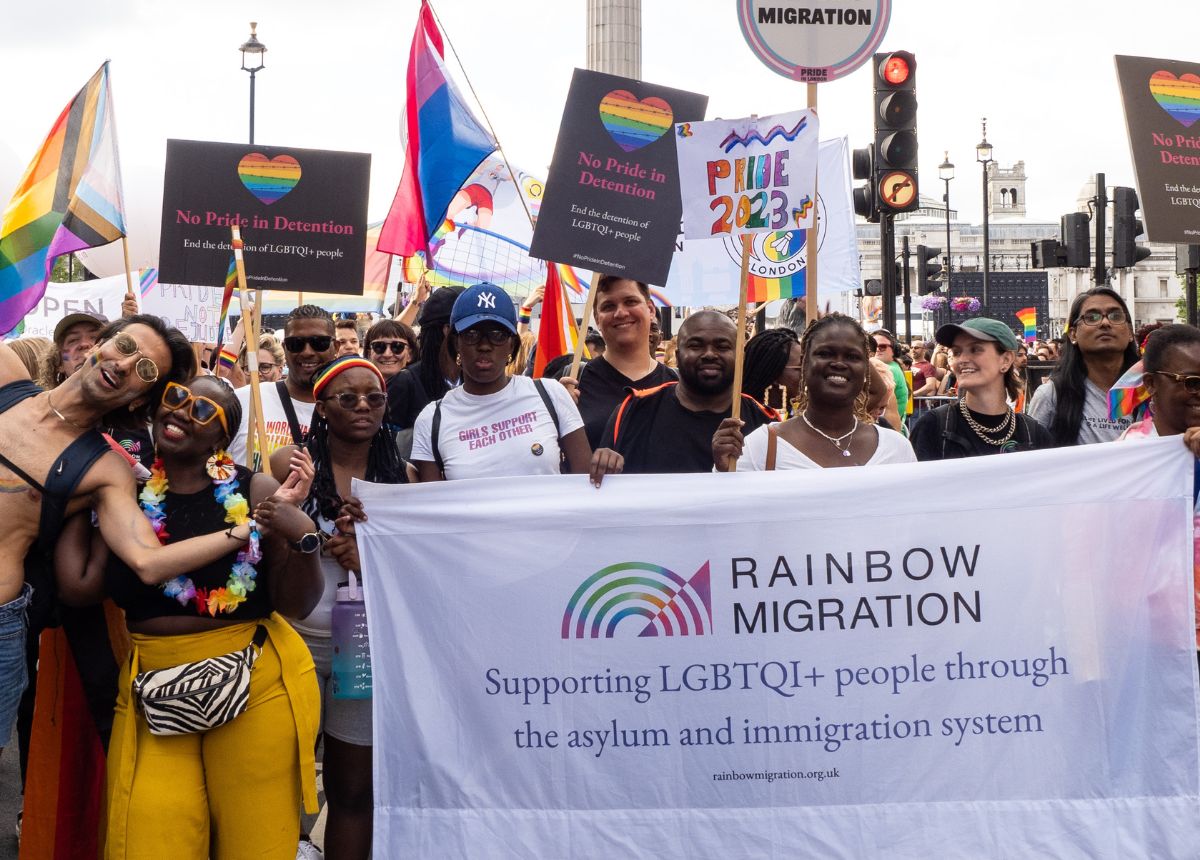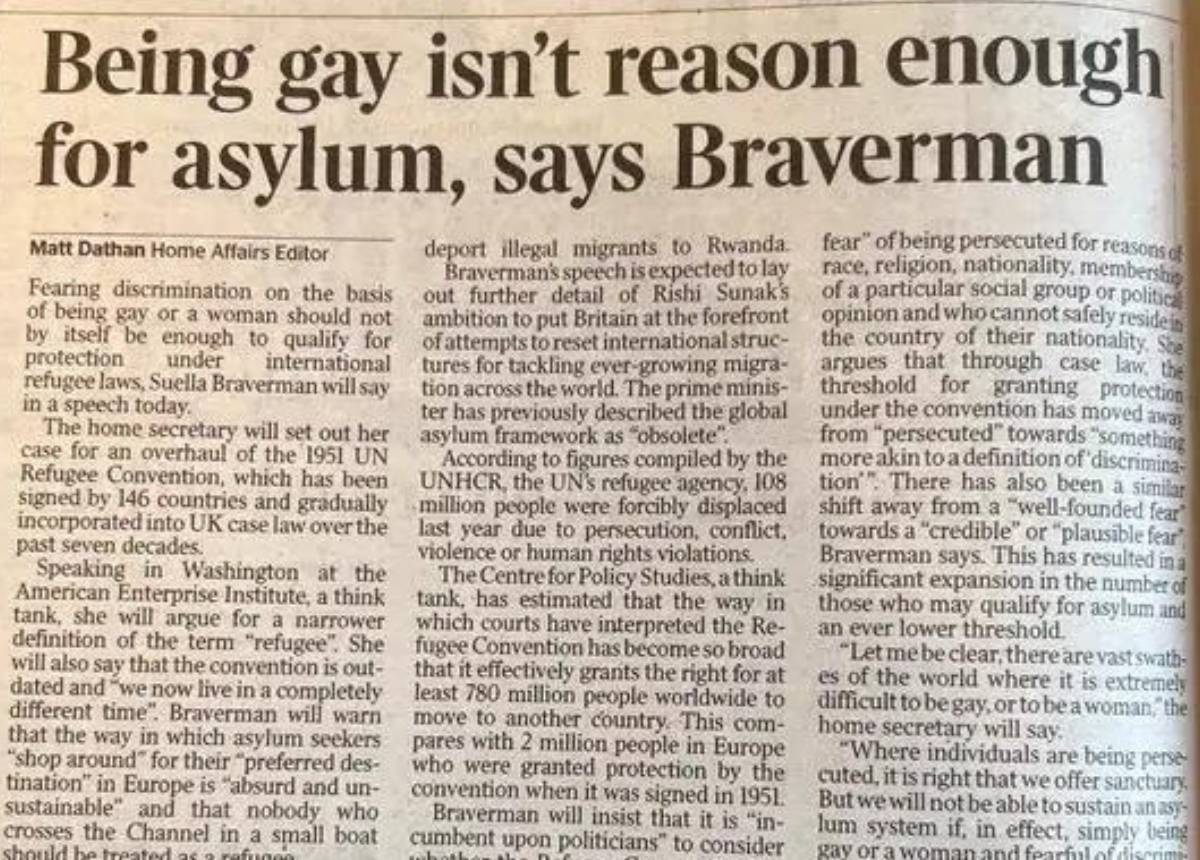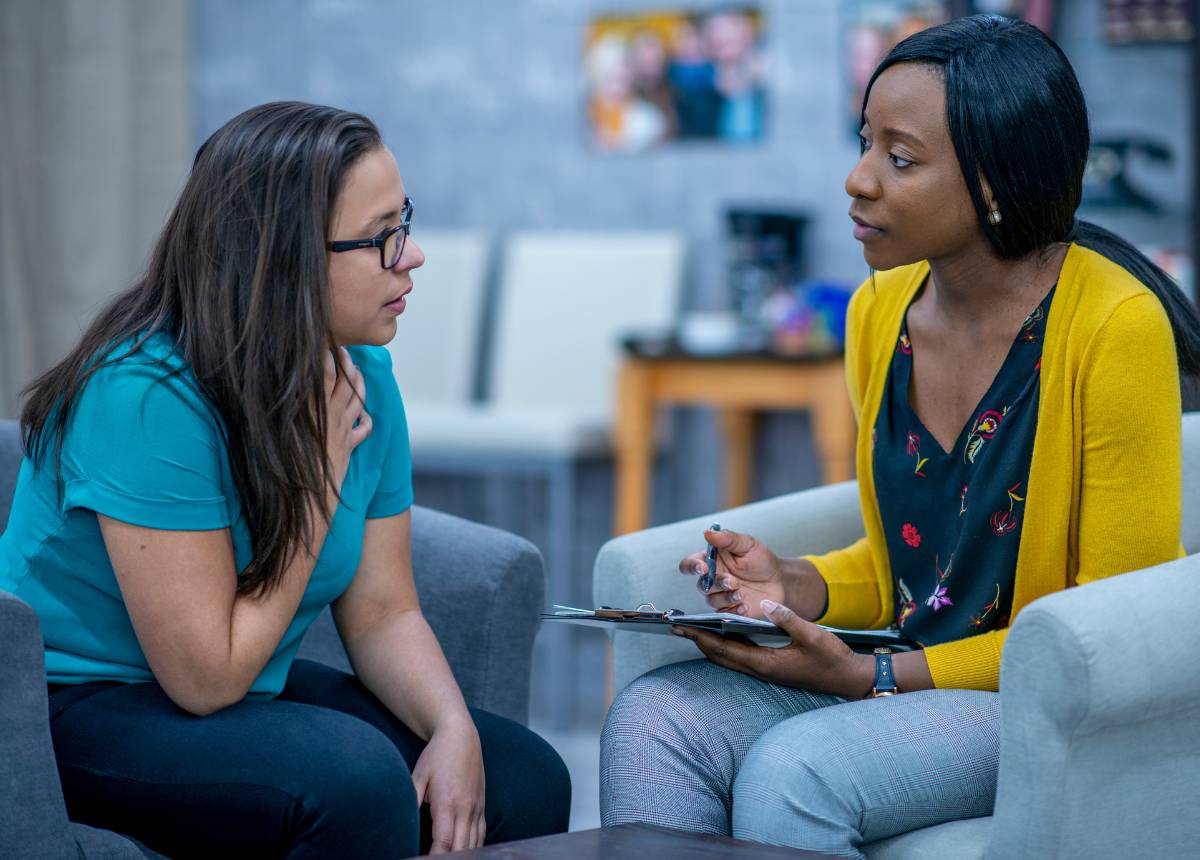Three ways you can make a difference this LGBT+ History Month
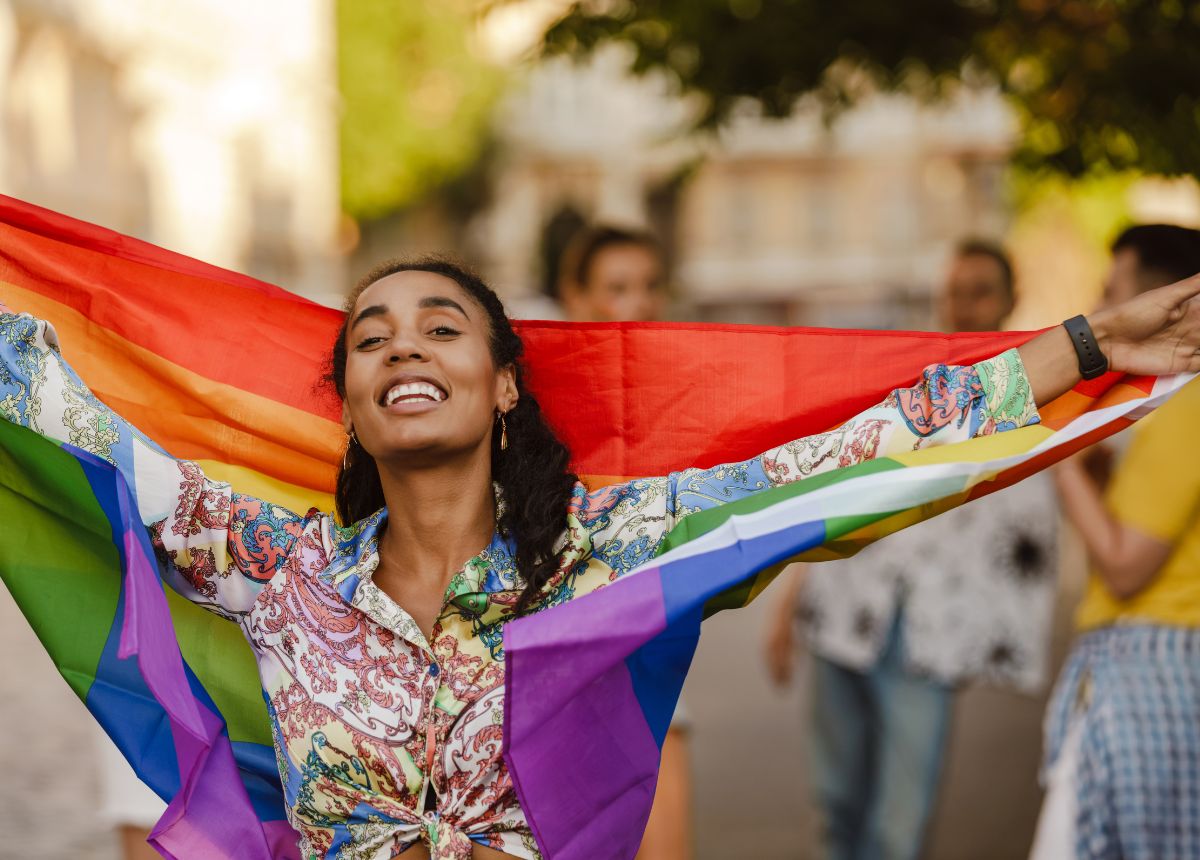
As we celebrate our history this month, we shouldn’t lose sight of the injustices still faced by some of our community in the UK today.
Right now LGBTQI+ people are being held in immigration detention, with no idea when they might be set free. We know that LGBTQI+ people face bullying, harassment and abuse in detention, but still this government won’t recognise that they should not be detained.
Instead, they plan to increase the use of detention – leading to even more LGBTQI+ people being locked away, and for longer periods.
Here are three ways you can help make sure LGBTQI+ people in detention aren’t forgotten this LGBT+ History Month:
1. Educate your friends about immigration detention. We have made a 1 minute video explaining the issue – would you share it with 3 friends who might not know about LGBTQI+ people in detention?
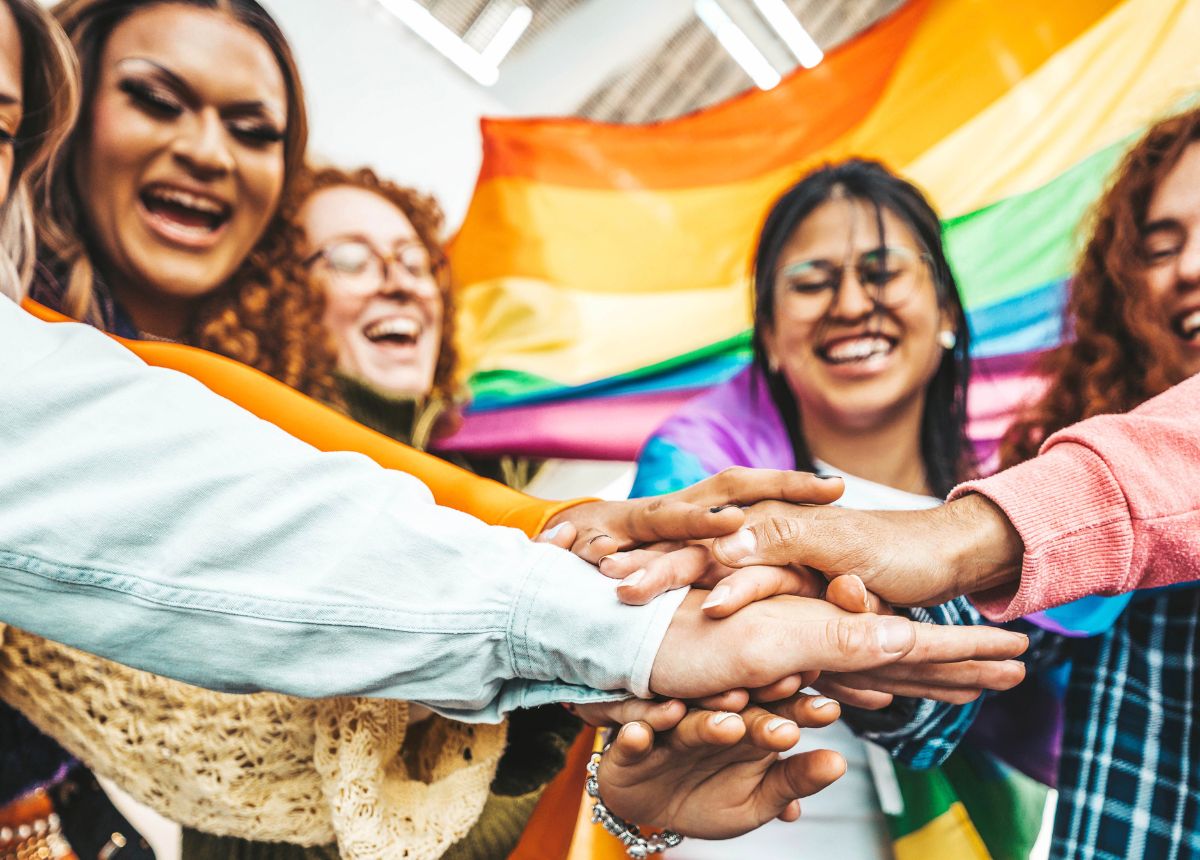
2. Get your community involved. Going to an LGBTQ community centre or venue this month? Why not take some No Pride In Detention flyers and ask them to display them – just let us know you want some and we’ll send them in the post.
3. Write to your local paper. Sending a short letter to the editor of your local paper is a great way to raise the profile of an issue. Our online form makes it really easy to do – you just need to edit the copy to show why you personally care about LGBTQI+ people in detention.
Whichever way you choose to help, thank you for your solidarity with LGBTQI+ people locked up in immigration detention.
LGBT+ History Month: Celebrating LGBTQI+ solidarity in our No Pride In Detention campaign
In our first blog for LGBT+ History Month we’re celebrating the queer solidarity shown by partners in our No Pride In Detention campaign.
No Pride In Detention calls for an end to the detention of LGBTQI+ people, who experience bullying, harassment and abuse while held in immigration detention. It’s an experience that has devastating consequences, but is so often overlooked or ignored – in part because detention only affects people subject to immigration control in the UK.
That’s why it’s so inspiring to see LGBTQI+ groups and organisations across the country join forces to say that we won’t stand for anyone in our community being locked up and subjected to bullying and abuse.
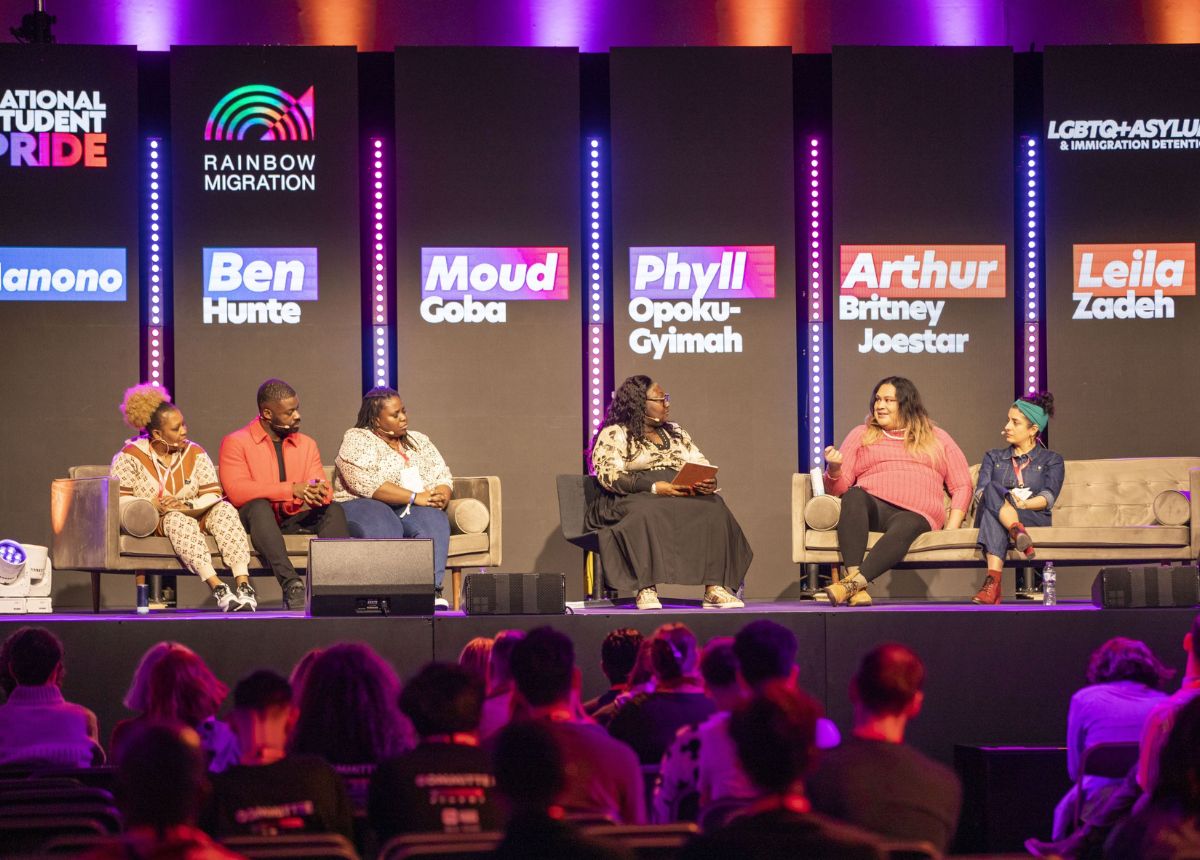
The organisations that make up the coalition are a diverse group – from big charities to radio stations and poetry groups. What brings us together is a sense of solidarity with LGBTQI+ refugee communities.
This LGBT+ History Month we want to showcase some of the amazing contributions these groups have made to the campaign.
Starting with Sahir House, who hosted us in Liverpool for two days while we worked with them and Many Hands One Heart on a film exploring the experiences of lesbian women in immigration detention.
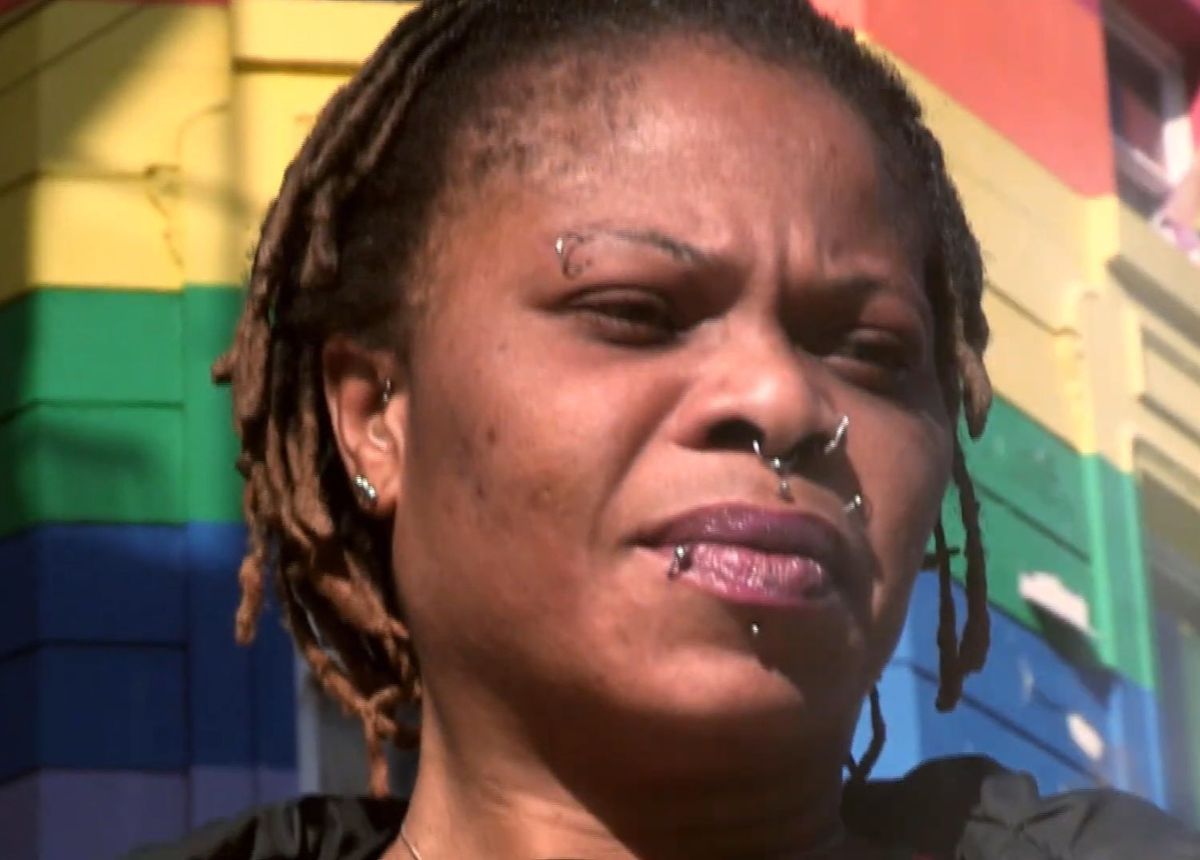
That film has enabled us to show LGBTQI+ audiences what detention is really like for those who are locked away. We have been honoured to screen it to the community in LGBTQI+ venues that are supporting the campaign, with events at the Ledward Centre in Brighton and London LGBTQ+ Community Centre.
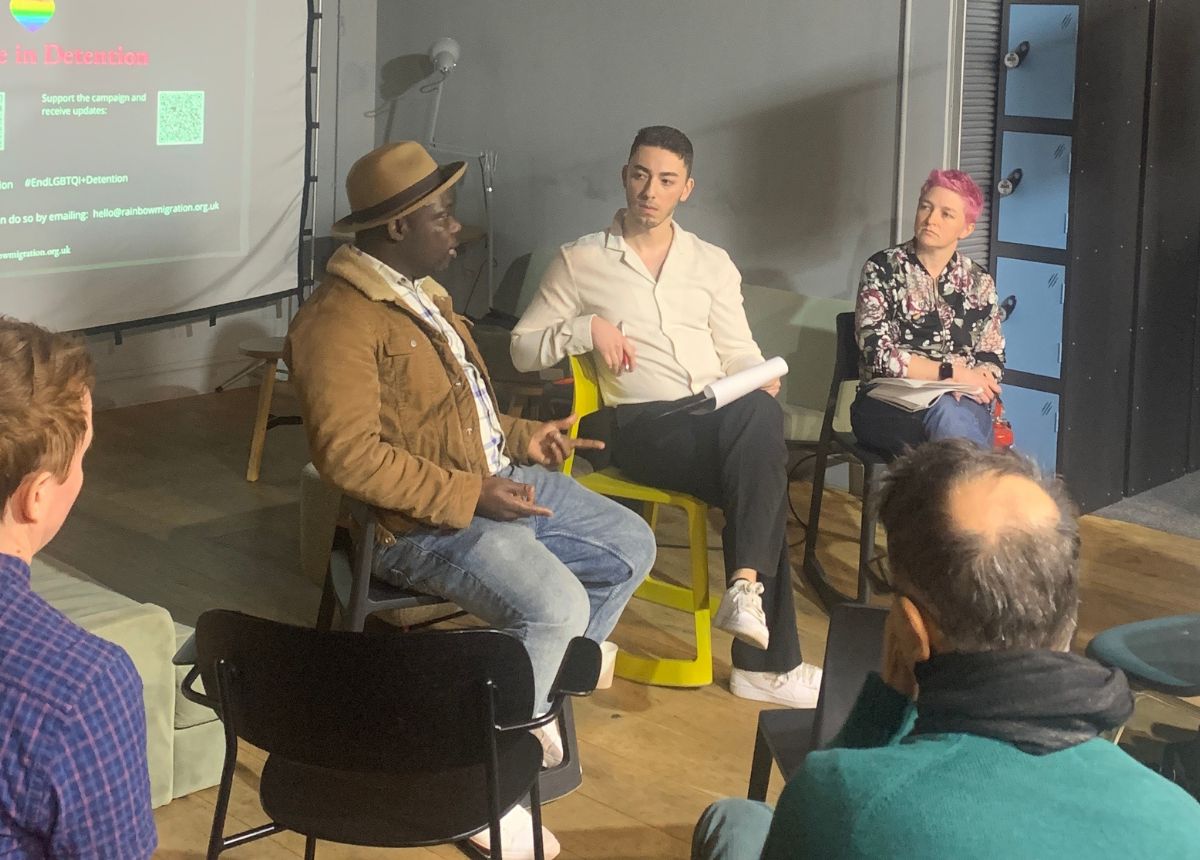
Other partners have joined in by taking the campaign to events – like Refugee Buddy Project campaigning at Hastings Pride and Trans Sober talking to the community at Brighton Trans Pride. And when it comes to influencing politicians, it is fantastic to have the backing of Stonewall, who included ending LGBTQI+ detention as one of their priorities for a new government in their Back On Track plan for LGBTQ+ equality in the UK.
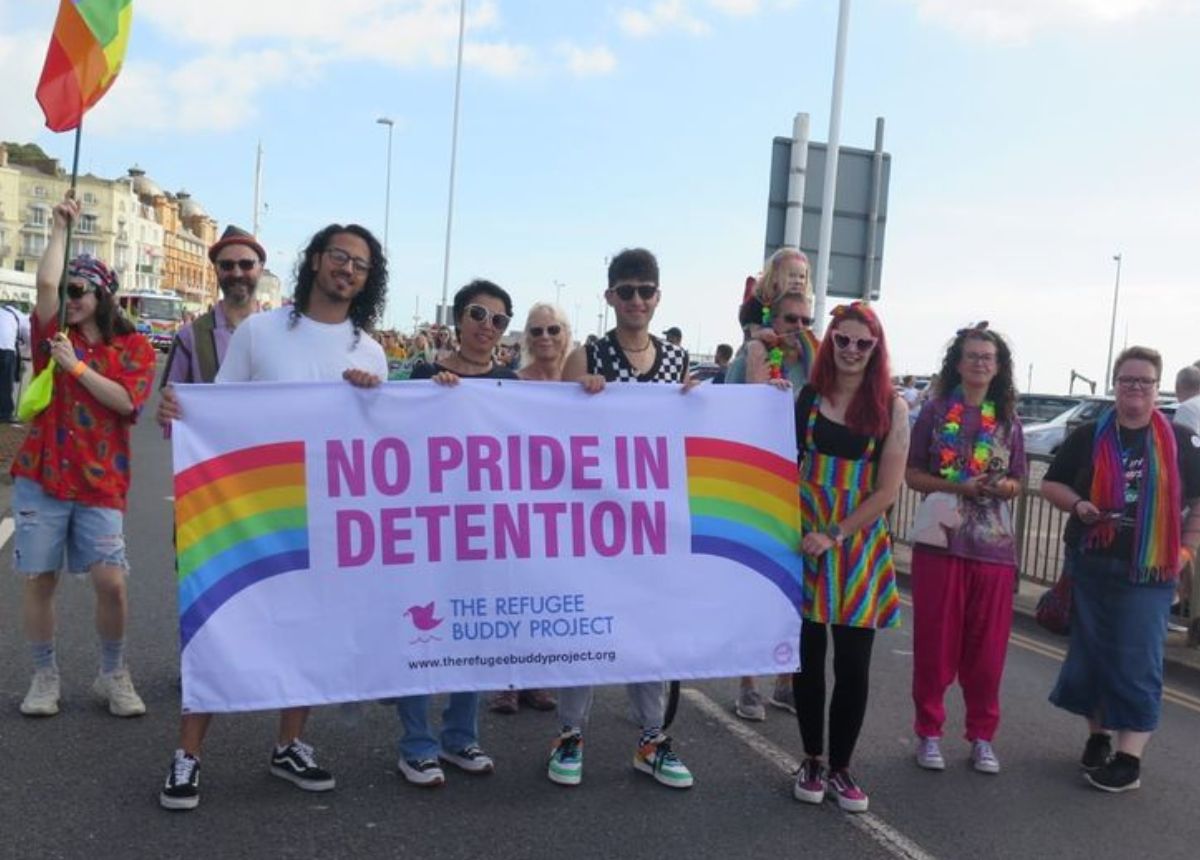
Spurred on by the injustices at Larne House Short Term Holding Facility near Belfast – where more than 5,000 people have been detained since it opened in 2011 – the campaign is also supported by 5 groups in Northern Ireland. Here NI, Rainbow Refugees NI, and End Deportations Belfast have been supporting tirelessly on social media to keep the issue in people’s minds.
If your group or organisation agrees that no LGBTQI+ person should be locked up indefinitely and subject to bullying and abuse, join us and become part of the movement to end LGBTQI+ detention. Check out the full list of organisations involved and sign you own group up today.
Together, we will win this!
Fine-art photography book 'Asylum' showcases portraits of LGBTQI+ refugees
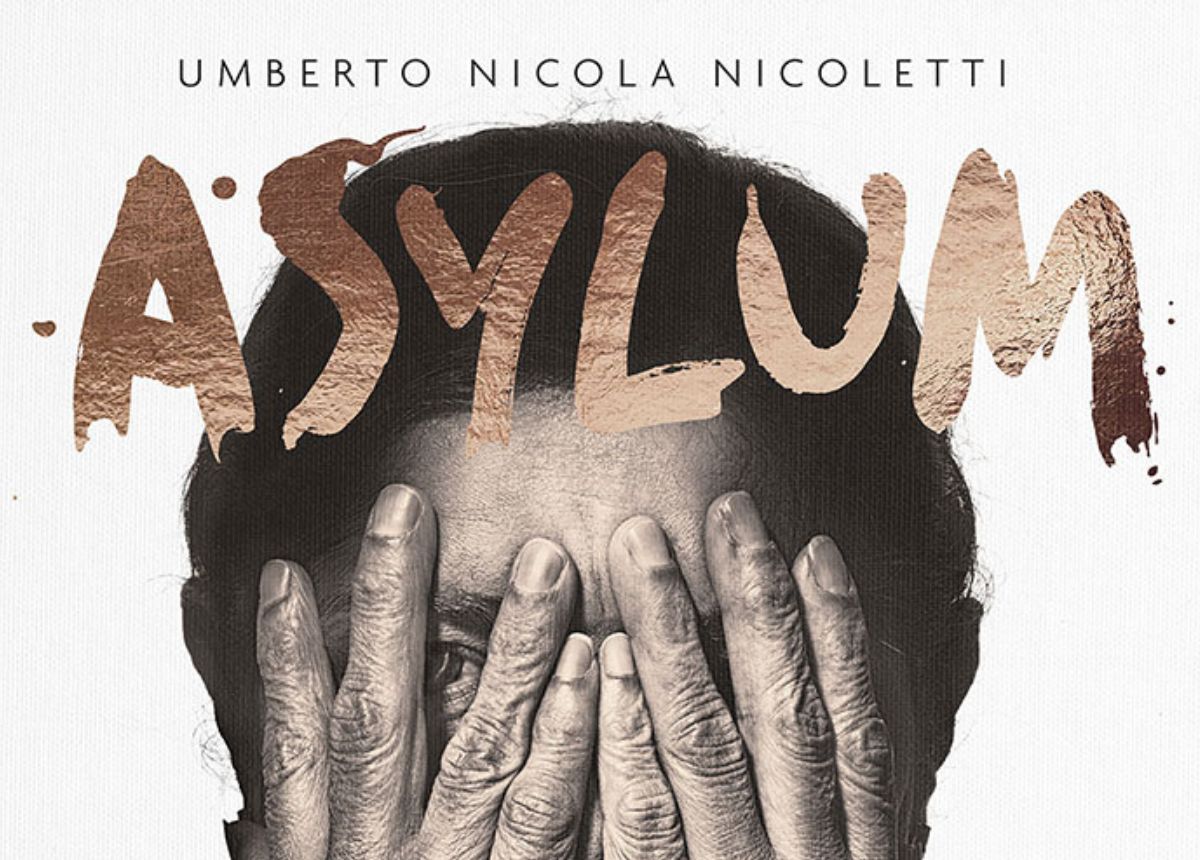
Umberto N. Nicoletti is a photographer from Italy; his book 'Asylum' features beautiful portraits of LGBTQI+ refugees from around the world.
What is ‘Asylum’ about, and what inspired you to make it?
I felt compelled to make a positive change in the world and embarked on a very special project, my first photography fine-art book, called ‘Asylum’. The book features portraits of LGBTQI+ refugees who are fleeing persecution in their home countries and describes the challenges they face as they seek safety and refuge elsewhere.
Thanks to a dear friend of mine, who volunteers for an organisation which supports LGBTQI+ refugees in Italy, I became aware of the issues facing people who are discriminated against because of their gender identity or sexual orientation, in many countries all over the world. I collaborated with this organsation to raise awareness among both the general public and the LGBTQI+ community.
I was devoted to “Asylum” for over six years. These images were captured by partnering up with five global organisations, including Rainbow Migration. These organisations help people in their asylum process and they also play a crucial role in the integration of LGBTQ+ refugees The other organisations I collaborated with are The 519 in Toronto, CIG Arcigay in Milan, The DC Center in Washington D.C., and RusaLGBT in New York. Each has been instrumental in bringing this body of work to life!

For people who haven’t seen the book yet, what will they find inside?
Inside are several portraits of LGBTQI+ refugees, all shot in just black and white. My photographic approach does not merely involve capturing images but rather portraying the individuality and complexity of each person. The lights and shadows are a visual metaphor. I don’t name them. The anonymity of the people in the photos not only respects their privacy but also symbolizes the struggles and pain that LGBTQI+ refugees face in their home countries, as they are forced to hide their true selves for fear of persecution and violence. This evokes a sense of empathy and frustration in the viewer, highlighting the urgent need for change and recognition of their humanity.
I use beautiful, glossy images, commonly associated with fashion and advertising, to shift the focus from the discrimination and hardships they face, to instead show their unique stories and inherent worth.
By portraying the refugees as celebrities, idols, and heroes, “Asylum” seeks to humanise LGBTQI+ refugees and restore their dignity. The stories contained within its pages are testaments to the remarkable qualities of resilience and perseverance that have propelled them forward in the face of adversity.
So “Asylum” is not merely a collection of beautiful pictures; it is a heartfelt and thought-provoking exploration of the human spirit and the journey toward a safer and more inclusive world for all.
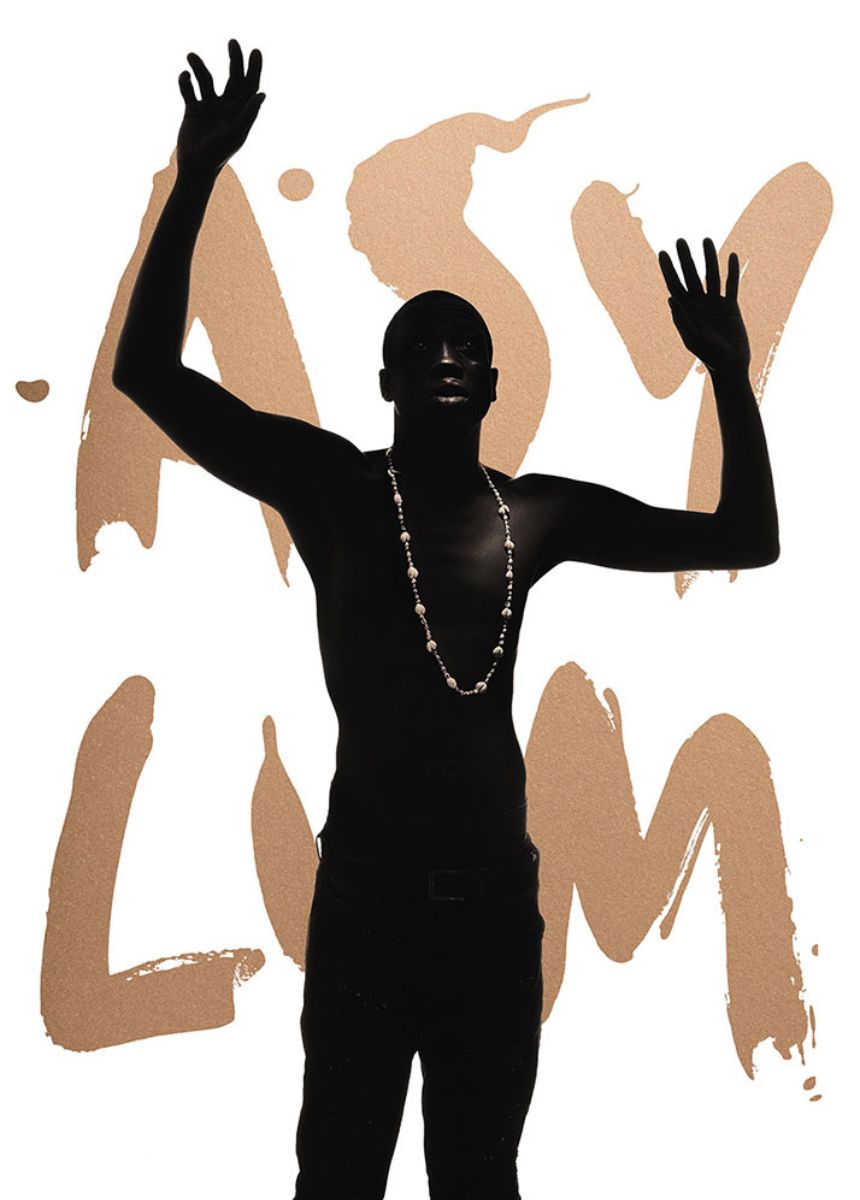
Did you encounter any challenges or issues while putting the project together, and if so, how did you overcome them?
The primary challenge I encountered was securing funding, due to people’s lack of awareness of the issue. I was also very concerned about safeguarding the people. I had to find a balanced compromise, enabling me to shed light on this vital matter while ensuring the well-being of those involved.
What did you learn about being LGBTQI+ and seeking asylum by doing this project?
I consider LGBTQI+ refugees to be real heroes. They show us the true state of human rights in the world. They suffer from terrible injustices just because of who they are and where they were born, which is something beyond their control and not based on their own worth. This is something we often overlook.
They are a reminder that no one should take their freedoms lightly and that it’s easy to fall back into unfair ways of treating people. Living in constant fear, worried about every little thing and every look from someone else, is no way to live. Not being able to trust people and always feeling threatened stops us from making deep connections with others, which I believe is the best part of being human.

What is the goal of your project? What message do you want to pass on to the world through ‘Asylum’?
The project aims to bring attention to the persecution many LGBTQI+ people face in their countries of origin, due to their gender identity or sexual orientation. It serves as a platform for the voices and narratives of people who are seeking safety to have the freedom to be who they are.
The goal is to start a conversation about the important ideas of acceptance, inclusion, and being welcoming, especially to LGBTQI+ people in their new countries. It’s sad to see that some refugees face unfriendly treatment from their own communities, which should never happen.
‘Asylum’ is not only a photographic documentation, but rather an art project that places a profound emphasis on the restoration of their inherent dignity.
I also hope to help this cause financially by getting donations through the website asylum-theproject.com. Anyone can give money to the organisations that are part of this project.
So, I’m pushing for a world where we value and support everyone’s freedom, and where we appreciate the variety of people that makes our life together better. Let’s practice understanding, encourage kindness, and aim for togetherness as we deal with the complicated ways our lives are connected.
‘Asylum’ was published in May 2023 by Rizzoli New York. Find out more.
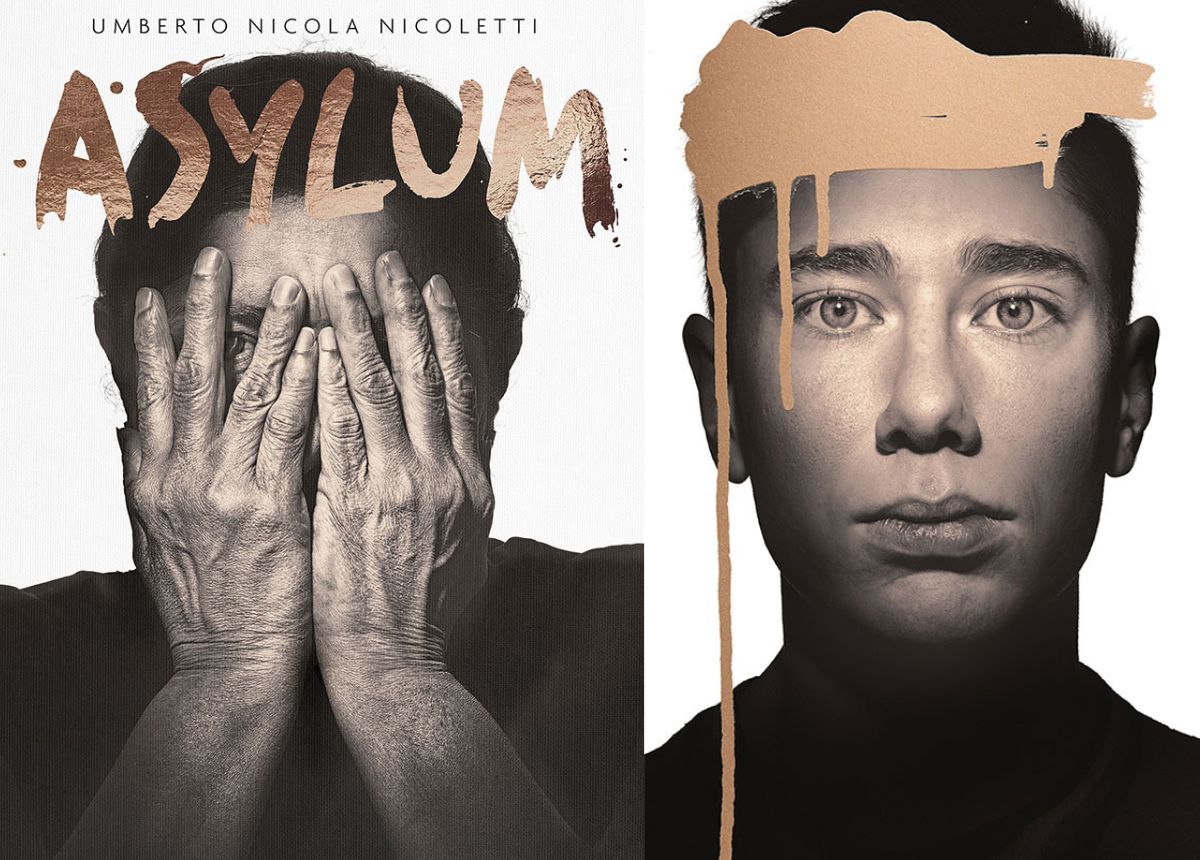
Are you LGBTQI+ with experience of the asylum system? You could help shape our strategy by becoming our trustee

Could you be our next trustee? At Rainbow Migration we are currently on the lookout for LGBTQI+ people who have been through the asylum system to join our board.
Our current board consists of people with a wide range of backgrounds, skills and experiences, including lived experience of the asylum system, law, communications, fundraising, finance, safeguarding, research and anti-oppression.
We’re interested in hearing from people who can use their insight of going through the asylum system to inform our governance and strategy. We are also interested in any other skills and experience you have from your life or your work history.
We encourage applications from people from all walks of life, and would particularly like to hear from you if you are a person of colour, trans, non-binary, intersex, disabled or neurodivergent.
Still unsure whether this opportunity is for you or not? Here are some frequently asked questions that might help you make a decision.
What will I be doing?
Trustees are legally responsible for Rainbow Migration. Your duties will include:
- Setting strategy. Our trustees have set our strategy for 2023-25 and need to ensure it remains fit-for-purpose, guides our activities and is updated when needed
- Ensuring we abide by our constitution, follow the law, and act in line with our values and policies
- Making good use of our money and resources
- Considering and mitigating risks
- Reporting to the Charity Commission
These are some of the matters trustees have discussed in recent meetings:
- Our finances, including setting the annual budget, and checking income and expenditure is on track
- Human resources (HR), including staff salaries, pensions and parental leave
- Organisational policies including safeguarding, health and safety, and data protection
- How changes in law and government policy could affect our service users and our work.
What if I don’t have experience as a trustee? Can I still apply?
You absolutely can. We will support you to develop in the role. For example, we can ‘buddy you up’ with an existing trustee that you can meet regularly to prepare for board meetings. We also provide training and can pay for you to attend relevant courses.
Will I be able to meet with people seeking asylum to help them?
The role of trustees is to govern the charity and ensure we are meeting the purpose for which we exist. You won’t have much involvement in the day-to-day work of the charity, so contact with service users will be limited.
I don’t have a computer. Is that a problem?
We don’t want technology to be a barrier to becoming a trustee. It’s helpful if you have a smartphone, at least, so that you have regular access to emails and can connect to meetings on Zoom. We can provide training if you need to learn how to use Word or Excel, for example. Please apply and we can talk about how we can help make sure you can participate fully.
Can I become a trustee if I’m applying for asylum?
We can only accept applications from people with leave to remain in the UK or UK citizenship. We would be happy to consider an application from you to become a trustee when we next recruit if you have secured leave to remain by then.
We are looking for refugees to join our board of trustees

***THIS RECRUITMENT HAS NOW CLOSED***
Rainbow Migration, the longest-running UK charity dedicated to supporting LGBTQI+ people through the asylum and immigration system, is seeking one or two new trustees who have sought asylum on the basis of their sexual orientation, gender identity/expression or sex characteristics.
We are looking for people who are passionate about our vision that LGBTQI+ people can settle in the UK and lead fulfilling lives, and our mission to support LGBTQI+ people through the asylum and immigration system. You should also be committed to our values:
- Safety: We believe everyone should be safe from persecution and safe to be themselves. We strive to create a safe workplace culture, and we place importance on the wellbeing of everyone involved with Rainbow Migration.
- Integrity: We are thorough and honest in everything we do, and we take responsibility for our actions. We want to be accountable to our communities and those who support us.
- Belonging: We welcome and include all LGBTQI+ people, and we celebrate and value their range of experience in terms of gender, religion, race, age, disability status and class. We try to remove obstacles to participation, champion equality and promote a sense of family or home through our services.
- Respect: We believe that every person is equal and deserves the same level of courtesy, care, and attention. We respect the rights, wishes and feelings of our service users, and campaign for their rights to be respected as they go through the asylum and immigration system.
At Rainbow Migration, we don’t just accept difference – we celebrate it, we support it, and we thrive on it. We’re proud to be an equal opportunity employer and we value diversity. We particularly encourage applications from people of colour and trans, non-binary and intersex individuals, as well as disabled individuals. We welcome applications from people who have not served on a trustee board previously, and you can live anywhere in the UK.
What will you be doing?
Being a trustee is a rewarding role. Trustees bring their expertise to shape our strategy and direction, and help ensure we remain the authoritative organisation on LGBTQI+ asylum and immigration. They have overall legal responsibility for the charity, make sure our finances and resources are well used to implement our mission, and are required to participate fully in the governance of the charity. Trustees also play a role as ambassadors for the organisation and its work. For more information see https://www.gov.uk/guidance/charity-trustee-whats-involved or https://www.youtube.com/watch?v=U8TIkLLwwdQ
What support will you receive?
We provide numerous resources for trustees to receive training on good governance and the duties of a trustee, as well as on charity finance. Trustees will also receive training on safeguarding, cyber-security and data protection. Other training can be arranged to suit your needs. Training costs are covered by Rainbow Migration.
Buddying up’ with an existing trustee can also be arranged, and this is encouraged for those for whom this is their first time serving as a trustee. This involves meeting up with a longer-serving trustee outside of board meetings, occasionally or regularly, to discuss:
- The format, style and content of board meetings generally
- Papers submitted to upcoming trustee board meetings
- Experiences serving on the board
You will also have induction meetings with Rainbow Migration staff.
What we do
We provide emotional and practical support for LGBTQI+ people seeking asylum, offer legal information and advice, and carry out campaigning, policy work and strategic litigation. We also train lawyers and other organisations working with LGBTQI+ people seeking asylum. We have a team of 16 full- and part-time staff, volunteer lawyers delivering advice on applications for partner and spouse visas, and volunteers with lived experience of the asylum system who give advice to our campaign No Pride in Detention.
Time and location
We are looking for people who can commit to being a trustee for at least three years. Each trustee has to be re-elected about once every three years. The maximum term limit for being a trustee is nine years.
Trustees meet in the evening about six times per year. Attendance at other ad-hoc meetings, events (such as the annual general meeting), or relevant committee meetings (e.g. on HR or finance) is also expected. Preparation for the meetings involves a time commitment of two to four hours for detailed reading of papers, which are provided several days in advance.
Meetings are usually held by Zoom. Where face-to-face meetings take place in London, travel costs for trustees will be paid for by the charity.
A few more details
The role of trustee is a voluntary position. Expenses incurred in relation to fulfilling trustee duties can be paid by the charity e.g. travel, phone top-ups.
Rainbow Migration is a membership organisation. We require our trustees to become members (£20 a year, which can be waived for trustees in cases of financial hardship). Trustees can be co-opted by the Board but have to be confirmed by Rainbow Migration’s members at the next annual general meeting (AGM).
This position is open to people who have leave to remain in the UK or UK citizenship. We cannot accept applications from people who are currently seeking asylum or are under the age of 16. Candidates must not have been previously disqualified as a trustee or company director, have an undischarged bankruptcy or have unspent criminal convictions for an offence involving dishonesty or deception (such as fraud).
If you are offered the role of trustee, we will later ask you to inform us if you have any criminal records that are still considered “unspent” – meaning you’re still in the process of rehabilitation for any convictions or cautions. After that, we will request you to obtain a “basic DBS certificate,” which Rainbow Migration will pay for. This certificate is a check we do with the Disclosure and Barring Service, and it only reveals details of convictions and cautions that are unspent. We use this information to assess if candidates are suitable for roles that may involve working with vulnerable individuals or positions of trust. Only offences or information that is relevant to the role will be taken into consideration. If you have an offence that is not, it won’t impact your ability to become a trustee. See our website for more information.
To apply
Please send:
- Your CV. If you do not have a CV, please provide a written, audio or video summary of your education, work and/or life experience
- Either:
- A covering email, or
- video or audio recording explaining why you are applying (no longer than two to five minutes)
to recruitment@rainbowmigration.org.uk by 10am on Friday 23 February.
When writing your covering email or making your video or audio recording, please explain why you are interested in being a Rainbow Migration trustee. We also want to hear about your skills and experience. Skills and experience could be from training, volunteering, interests or life experience. Our current trustees have skills and experience covering lived experience of the asylum system, law (public law and human rights), business management, communications, fundraising and finance.
If you are an expert by experience (a refugee or a migrant with direct, first-hand experience of issues and challenges of the UK asylum or immigration system), you can ask for an independent and confidential support for your application from the Experts by Experience Employment Network (www.ebeemployment.org.uk). Please complete this form to request support and they will confirm if they can match you with a mentor to support your application.
If you would like further information about the role or to have an informal discussion with our Executive Director or an existing trustee, please contact recruitment@rainbowmigration.org.uk.
Shortlisted candidates will be invited to an informal interview with the Executive Director and another trustee, which can be by phone, online or in-person in London (the costs of participating or attending can be paid by the charity, e.g. travel or phone data). The preferred candidate will then be invited to observe a board meeting so that both they and the organisation can feel confident that the role and organisation is right for them.
Privacy notice
We are committed to protecting your personal data and respecting your privacy. By applying for a role as a trustee, you agree that we may collect, use and disclose your personal data for the purposes of recruitment. We will not share your personal information with anyone outside Rainbow Migration without your consent, which you can withdraw at any time. Information is kept for the minimum period necessary, which for unsuccessful applicants is 12 months after the conclusion of the recruitment campaign. Please see our privacy policy for full details.
You can also read more about what our trustees do.
We are hiring: Legal and Support Services Assistant
***THIS RECRUITMENT HAS NOW CLOSED***
We are recruiting for a Legal and Support Services Assistant to act as a first point of contact for the charity and assist the legal and support services teams.
We are looking for a Legal and Support Services Assistant to help ensure smooth delivery and monitoring of our services. You will be the first point of contact for new queries and play a key role in providing the information needed and allocating to the relevant services.
This role will receive full training and support as required to deliver your responsibilities, which include the following:
- Provide admin support for the legal and support services teams
- Answer calls and emails
- Make appointments for service users or signpost them to other organisations
- Organise legal advice sessions for asylum and partnership service users
- Input data onto our Salesforce database
- Write minutes for legal and support service team meetings
- Assist with organising and running events (e.g. Pride, service user Christmas party)
- Assist with preparations for training and presentations
Rainbow Migration’s vision is that LGBTQI+ people can settle in the UK and lead fulfilling lives. Our values are:
- Safety: We believe everyone should be safe from persecution and safe to be themselves. We strive to create a safe workplace culture, and we place importance on the wellbeing of everyone involved with Rainbow Migration.
- Integrity: We are thorough and honest in everything we do, and we take responsibility for our actions. We want to be accountable to our communities and those who support us.
- Belonging: We welcome and include all LGBTQI+ people, and we celebrate and value their range of experience in terms of gender, religion, race, age, disability status and class. We try to remove obstacles to participation, champion equality and promote a sense of family or home through our services.
- Respect: We believe that every person is equal and deserves the same level of courtesy, care, and attention. We respect the rights, wishes and feelings of our service users, and campaign for their rights to be respected as they go through the asylum and immigration system.
At Rainbow Migration, we don’t just accept difference – we celebrate it, we support it, and we thrive on it. We’re proud to be an equal opportunity employer and we value diversity. We do not discriminate on the basis of race, religion, colour, national origin, gender, gender identity, sexual orientation, age, marital status, or disability status – simple, we consider all qualified applicants, consistent with any legal requirements.
We welcome applications from candidates with lived experience of going through the UK asylum or immigration system or who have been subject to immigration control, and also people of colour who are currently underrepresented among our staff. We offer a guaranteed interview scheme for anyone considered as disabled under the Equality Act 2010 if they meet the necessary criteria in the person specification.
Owing to the nature of the work, the successful applicant the successful applicant will be required at the point of conditional job offer to disclose all unspent criminal records and subsequently to undergo a basic DBS check.
Contract type: Permanent
Hours: Full-time (35 hours per week). Working part-time or job-sharing will be considered. Occasional work in the evenings and at weekends may be required but with plenty of notice. Rainbow Migration encourages staff to maintain a good work life balance and has a TOIL system in place.
Salary: Starting at £22,789 with potential annual step increases up to £25,648 (pro rata if working part time), plus statutory employer’s pension contribution. In addition to an annual step increase, the trustees consider giving a separate inflationary increase every April.
Location: Rainbow Migration’s offices are based in Borough, Central London. This role will have an office-based contract but the postholder can choose to work from home for part of the week in agreement with their line manager and Executive Director. You must be available to work from our offices in London when necessary. The successful candidate would also be welcome to work from the office full-time if that is their preference. At the time of posting this advert, none of our staff are going into the office every day. There might also be occasional travel outside London with plenty of notice. Please contact us if you have any questions.
Annual leave: 25 days per year rising after 24 months by 1 day after each year of service to maximum of 28 days per year (pro rata if working part-time)
Wellbeing: We offer up to 2 days of wellbeing leave to be taken at short notice in each calendar year. One-to-one clinical supervision is also available for this role.
How to apply:
Please read the job description and person specification.
Closing date: 10 am, 28 November 2023
Interview dates: TBC in December
Please read the job description and person specification. If you have any questions about the role or would like to find out more before applying, then you can contact the line manager via recruitment@rainbowmigration.org.uk.
Please send:
1. Your CV
2. A written statement (max 1,000 words), video or audio recording (max 8 minutes)
3. Optional: a completed monitoring form to recruitment@rainbowmigration.org.uk.
In your statement, please:
1. Give examples of how you meet the person specification. In addition to what is on your CV, we want to hear about any relevant skills and experience that demonstrate you meet the necessary criteria for the role, and if you meet any of the advantageous criteria. Skills and experience could be from training, volunteering, interests or life experience
2. Confirm if you wish to be considered under the guaranteed interview scheme for anyone considered as disabled under the Equality Act 2010 (physical or mental impairment that has a ‘substantial’ and ‘long-term’ effect on your ability to do normal daily activities)
3. State how many hours a week you wish to work and if you have a preferred pattern, or if you are applying as part of a job-share
By submitting an application, you:
1. Confirm that you have the right to work in the UK and will produce the necessary documentation if you are offered this post
2. Declare that to the best of your knowledge and belief, the information provided with your application is true and correct and that you understand that any false information or statement given will justify the dismissal from Rainbow Migration if appointed
3. Accept that, if successful, you will be required to disclose all unspent criminal records at the point of conditional job and subsequently to undergo a basic DBS (Disclosure and Barring Service) check
We are proud to be a member of the Experts by Experience Employment Network, which aims to create a charitable sector that is led by people with lived experience of the asylum and immigration system. As part of this network, we challenge the one-size-fits-all approach in our employment practices, and respect personal circumstances and needs of people with lived experience.
If you are an expert by experience (a refugee or a migrant with direct, first-hand experience of issues and challenges of the UK asylum or immigration system), you can ask for an independent and confidential support for your job application from the Experts by Experience Employment Network. Please complete this form to request support and they will confirm if they can match you with a mentor to support your application.
Privacy notice
If you apply for this role the information you provide will be processed according to Rainbow Migration's privacy policy. Rainbow Migration will not share your information with any third parties unless part of the recruitment process or are legally required to do so. By applying, you are permitting Rainbow Migration to access and use the information for recruitment purposes. Rainbow Migration will store your data for 12 months after the conclusion of the recruitment campaign. Monitoring information is kept separately and is pseudonymised to avoid identification of applicants, is amalgamated for statistical purposes and the original data is then deleted after 6 months.
A video guide to intersex asylum claims
We have put together a new video guide for Intersex people who are going through the asylum process in the UK. The video includes advice about writing your statement for your claim, preparing for the Home Office interview, talking about your medical history, and more.
The video features British Sign Language interpretation, and you can also watch it with subtitles of 11 different languages, available via the playlists.
We hope you find the video helpful!
Our response to the Home Secretary who thinks "being gay isn't reason enough for asylum"
We are appalled to hear that the Home Secretary is questioning the legitimacy of LGBTQI+ people claiming asylum in the UK. Many LGBTQI+ people that we support every day tell us how they faced life-threatening situations back home.
For example, we have worked with Adams, who was violently attacked in the street on several occasions by members of his community in Ghana because he was bisexual, and his partner was killed. We also supported Miki whose brother threatened to kill him when he came out as a gay man in Azerbaijan.
The government’s own statistics suggest that only 2% of all asylum claims in 2022 included sexual orientation as a reason for needing protection. It is already the case that LGBTQI+ people must face a well-founded fear of persecution to qualify for refugee protection in the UK.
They also face the enormous challenge of having to “prove” their sexual orientation or gender identity to get refugee status.
Most of us welcome refugees and want to help people who are fleeing for their lives. The Home Secretary should stop her cruel rhetoric and instead create an asylum system that treats people with dignity and compassion.
"To have our human rights respected and protected has changed so many lives forever."
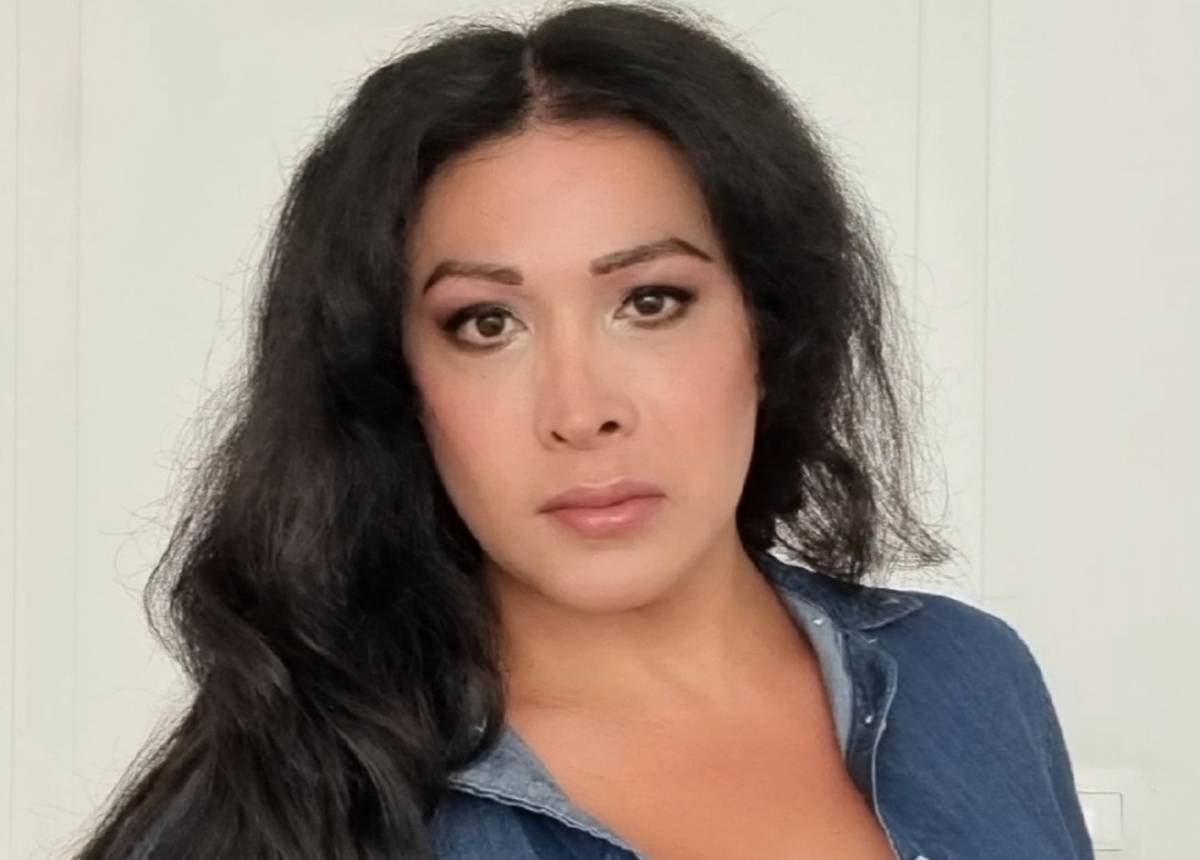
To celebrate our 30th anniversary, we spoke to many of the people who are an important part of our history. Below, Sasha Taylor told us what the organisation means to her.
My name is Sasha Taylor. I currently live in the UK; I grew up between Guatemala and Mexico, where I volunteered with several organisations as a human rights activist. Thanks to this work I have spent time observing and listening to other people, and seen very closely how difficult, deplorable and unfair life is for an LGBT+ person in those countries. I know this myself through my own personal experiences; I know very well that there is no equality, respect, protection and fulfilment of LGBT+ life and human rights.
Even when I saw, lived and faced very difficult situations, I tried to survive and have a life, but there comes a time in life when the mind, and your dignity and self-respect as a human being are not enough to hold on anymore, and that is what happened to me.
Being a constant victim of sexual harassment, discrimination, physical and verbal aggression, I had no choice but to flee my country.
“I’d like to celebrate all the support Rainbow Migration gave me so I could settle in the UK, and the impact that has had on me and my life and the lives of so many other people.”
Yet once I left, I was sold and ended up as a victim of human trafficking. I managed to escape and returned to the UK, but I no longer trusted or believed in anyone. It took me days to get the courage to seek help. I eventually contacted the Samaritans, who put me in touch with other organisations, among them Rainbow Migration (then called UKLGIG).
I still remember the day of my first appointment. I arrived near the building, it was about half a block away, for a moment I thought about turning back and not going in, I was struggling emotionally, because of everything that had happened to me. I was scared and distrustful of everything and everyone, but something made me not lose faith, I took courage and went in. The receptionist asked me to wait, then a Support Worker picked me up and we went into a small room. She introduced herself; she had a very friendly face. I felt she was very serene and respectful. She asked me what they could do for me. My English was very bad at that time, so we helped each other with a translation application. I introduced myself, I told her what had happened to me, I told her that I was tired of being a victim and that I needed help. I cried and unburdened myself at that moment, because after so long finally someone listened to me.
Since then, I have remained in touch with Rainbow Migration. They helped me with my case, and found me the legal, social, medical and emotional support I needed. Thanks to all that support, today I am here, safe, and with a stable, peaceful and happy life.
I’d like to celebrate all the support Rainbow Migration gave me so I could settle in the UK, and the impact that has had on me and my life and the lives of so many other people. To have our human rights respected and protected has changed so many lives forever.
"It's like comparing night and day": community-based alternatives to detention
Imagine a world in which people trying to make the UK their home were met with a supportive environment, not a hostile one. A world where people without immigration status were supported to understand their options and make informed decisions about their next steps, rather than being detained and threatened with removal.
This approach is not only possible, but tried and tested within the UK. Following a recommendation from Stephen Shaw’s second report on immigration detention in 2018, the Home Office commissioned a series of pilot projects to test community-based “alternatives to detention”, both of which have now concluded and been subject to an independent evaluation.
The results of both initiatives are clear. Supporting people who might otherwise be detained to navigate the asylum and immigration system in the community instead:
- is better for their mental health and wellbeing
- costs less than detaining them, and
- does not affect compliance with Home Office directives.
We must remember that detaining people going through the asylum and immigration system is a choice our government makes. It’s a choice that destroys lives, tears communities apart and has devastating consequences for those who are locked up with no idea when they might be set free. It puts LGBTQI+ people in a dangerous situation where they face bullying, harassment and abuse.
Nobody benefits from detention, except the private contractors who are paid millions of pounds a year to run the UK’s detention centres. But we could all benefit from an approach that sees people supported in our communities and empowered to make decisions that are right for them. For LGBTQI+ people who have fled persecution and could otherwise be detained here, it would mean having the chance to live openly and with dignity while they claim asylum in the UK.
With an alternative on the table that is compassionate, humane and cost-effective we cannot let this government continue its plans to re-open Campsfield and Haslar detention centres and tender for three new centres as well.
Help spread the word about compassionate alternatives to detention by emailing your MP.
Read on to learn more about the two pilot projects.
King’s Arms Project – Refugee and Migrant Advice Service
Last month UNHCR published the evaluation of a pilot project delivered by the King’s Arms Project (KAP) in Bedford. Between 2020 and 2022, 84 people without immigration status who were liable to detention were supported in the community through KAP’s Refugee and Migrant Advice Service (RMAS).
People taking part in the pilot received free, high-quality legal counselling and one-to-one support from a caseworker. That one-to-one support was flexible and tailored to individual needs – for example help with accessing healthcare, setting up bank accounts, social inclusion or accessing training/volunteer opportunities.
By the end of the pilot, 80% of people had been offered viable options to regularise their immigration status. They experienced better self-esteem and wellbeing, a better understanding of their legal options, and increased confidence and ability to access entitlements. As a result they were able to make informed decisions about their situation.
NatCen, who evaluated the project, estimated the pilot to be two-thirds cheaper than it would have been to detain the individuals supported.
“It’s like comparing day and night. King’s Arms Project is like the day where the sun is out and my life before was like in the night, without stars.”
Action Foundation – Action Access
RMAS was preceded by Action Access, delivered by the Action Foundation in Newcastle from 2019 – 2021. That project supported women seeking asylum in the UK, most of whom were detained in Yarl’s Wood prior to joining the pilot. As with RMAS, the women were given legal counselling and one-to-one support, however the Action Access pilot also provided them with shared accommodation and subsistence payments.
Unsurprisingly, the women moved from detention to this project experienced immediate improvements to their health and wellbeing. They experienced greater stability while on the pilot, and were better able to understand their options and make informed decisions about their asylum cases.
Despite being hampered by the coronavirus pandemic and having to run below capacity, Action Access was cheaper per participant per night than detention. In the evaluation NatCen estimated that potential savings from extending the pilot (e.g. running it at capacity and entering into longer leases to save on rents) could see the cost come down to less than half the cost of detaining someone.
“In detention, you don’t have this kind of positive atmosphere. You just want to cry. You just want to stop eating. You just want to kill yourself. This is because you are so in trouble there, right. Then, when you come out, it’s like everything is going to be nice again… the atmosphere is very different, and I think you recover yourself.”

